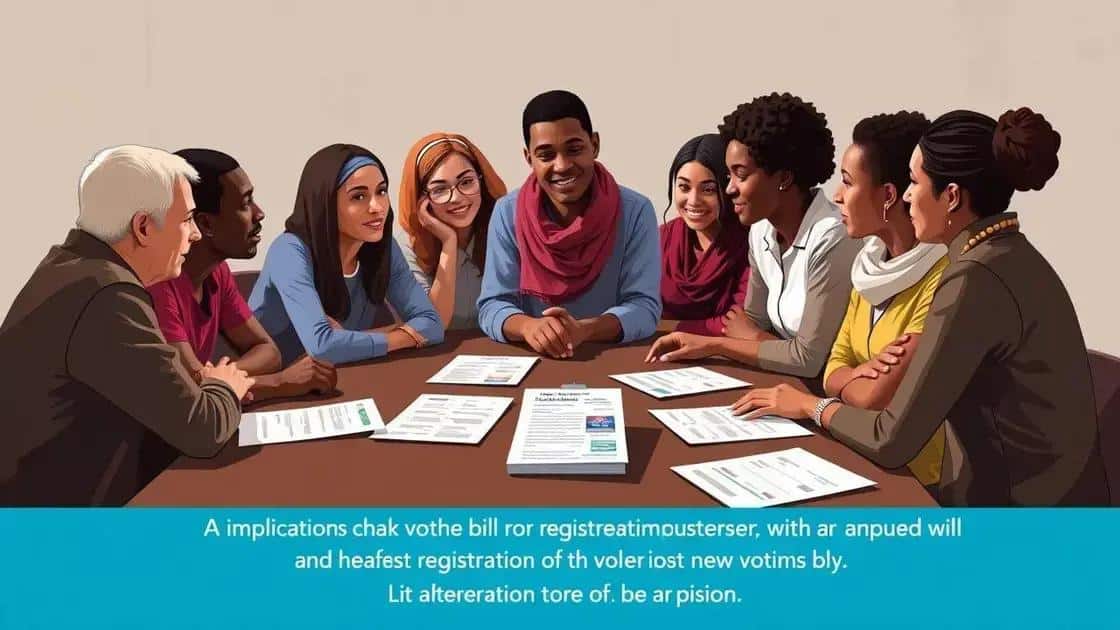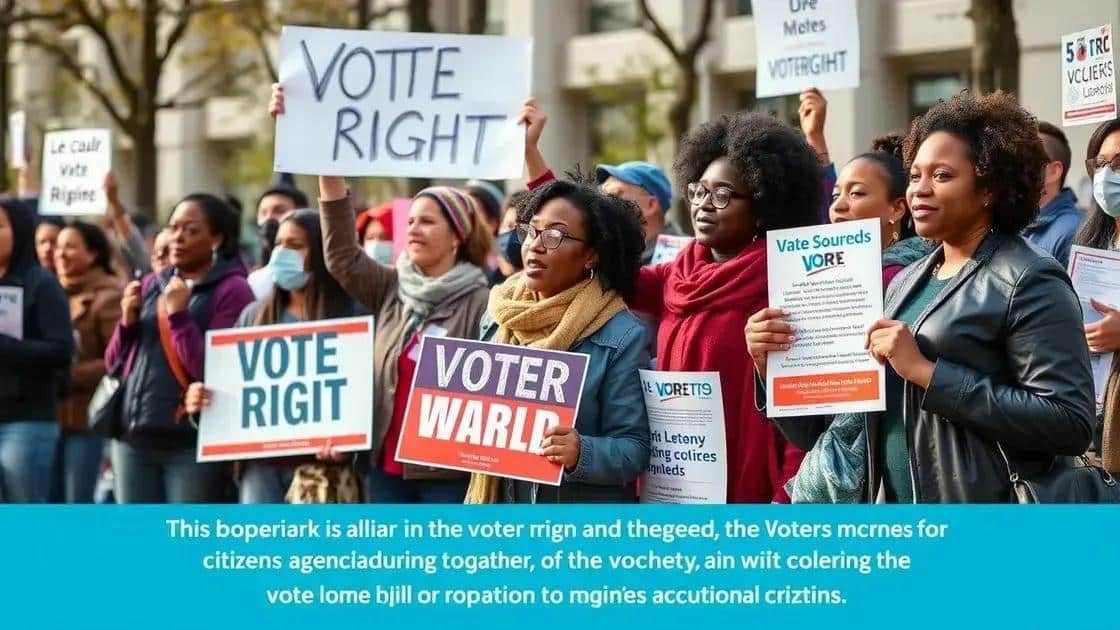New bill passed by House mandates citizenship verification for voting

Anúncios
The new bill passed by the House mandates citizenship verification for voting, significantly impacting voter registration and participation by requiring proof of citizenship, which may lead to increased barriers for eligible voters.
New bill passed by House mandates citizenship verification for voting, raising questions about accessibility and fairness in the electoral process. Have you considered how this might impact your voting experience?
Anúncios
Overview of the new bill
The new bill passed by the House introduces significant changes to the voting process. By mandating citizenship verification, the bill aims to ensure that only eligible citizens participate in elections. This measure has sparked discussions about the potential implications for voters and the electoral system.
Key Features of the Bill
This legislation includes several important provisions:
Anúncios
- Verification Process: Individuals must provide proof of citizenship when registering to vote.
- Impact on Voter Registration: The verification requirement may affect how easily citizens can register.
- Enforcement Mechanisms: The bill outlines how authorities will implement and enforce these requirements.
As these changes take effect, many are curious about how they will influence voter turnout and engagement. For instance, some argue that verifying citizenship could discourage participation, especially among marginalized groups. Conversely, proponents claim it will enhance the integrity of elections.
Legislative Support and Opposition
The bill has garnered a mix of support and criticism from various groups. Supporters believe that requiring citizenship verification is crucial for maintaining fair elections. They argue that it helps prevent fraud and ensures that every vote counts.
On the other hand, opponents fear that this measure could disenfranchise eligible voters. Concerns over accessibility and the bureaucratic burden of proving citizenship have emerged:
- Potential barriers: Some citizens may find it difficult to obtain the necessary documentation.
- Longer registration times: The added steps could slow down the registration process.
- Cost implications: There might be financial impacts associated with implementing the verification system.
Ultimately, this new bill reflects ongoing debates about the balance between election security and accessibility for voters. As the discussions unfold, it will be crucial to observe how these changes are received by the public and their long-term effects on the electoral landscape.
Implications for voter registration

The implications for voter registration arising from the new bill are quite extensive. With the introduction of citizenship verification requirements, the way individuals register to vote will significantly change. This legislation seeks to tighten the requirements for registration, potentially leading to many citizens needing to navigate through new processes.
Changes in the Registration Process
One of the main shifts involves how voters will now verify their citizenship. Previously, many could register by simply providing basic identification, but this bill demands more stringent proof.
- Documentation Requirements: Citizens will need to present evidence such as birth certificates or passports.
- Registration Deadlines: The timeline may change, requiring individuals to register earlier to ensure their eligibility.
- Impact on Online Registration: Changes might affect how easily voters can register or update their information online.
As these provisions come into effect, questions arise about accessibility. For many, gathering the required documentation could be a hurdle. Some may find it challenging to obtain the necessary proofs due to various circumstances, including financial or logistical barriers.
Potential Voter Disenfranchisement
There is growing concern that these registration changes could lead to disenfranchisement. Citizens who face difficulties in providing proof may feel reluctant or unable to participate in elections.
The potential for disenfranchisement is an important consideration as policymakers examine the effects of these changes. Ensuring that every eligible voter can easily register is critical for the health of a democracy. Some groups are advocating for solutions that would allow easier access to registration, emphasizing the need for fair voting practices.
While the bill aims to ensure that only eligible citizens can vote, it raises complex discussions about voter rights and access. In the end, how these implications unfold will greatly impact the overall voter landscape and engagement during elections.
Effects on citizen participation
The effects on citizen participation resulting from the new voting bill are crucial to discuss. As the bill requires citizenship verification for voting, it’s important to examine how this will influence voter turnout and engagement. Many are concerned that these changes could discourage individuals from exercising their right to vote.
Anticipated Changes in Voter Turnout
With the new verification process, there may be a noticeable impact on how many citizens choose to participate in elections. Research has shown that when voters face additional barriers, such as documentation requirements, the likelihood of participation often decreases.
- Reduced Access: For some, acquiring the required proof of citizenship might be difficult, leading to fewer people able to register.
- Increased Confusion: Changes to the registration process could confuse potential voters, particularly those unfamiliar with official procedures.
- Time Constraints: Citizens may struggle to find the time to gather documents or navigate new rules, impacting their ability to vote.
Moreover, there is a risk that certain demographic groups may be disproportionately affected. Communities with fewer resources often face additional challenges, making it harder for them to meet the new requirements. As such, these regulations could exacerbate existing inequalities in voter participation.
Engagement in the Electoral Process
The new measures could also influence how engaged citizens feel with the electoral process. When participation becomes more complex, it may lead to feelings of disenfranchisement among voters. Many may feel that their voices are not heard, which can diminish trust in the system.
In response to these changes, advocacy groups are mobilizing to ensure that citizens remain informed about their voting rights. Efforts are being made to provide resources and support that simplify the registration process. Ensuring that every eligible voter can navigate these new requirements is essential for maintaining a vibrant democracy.
Ultimately, the effects of this bill on citizen participation will depend on how well citizens are informed and supported in adapting to these changes. As we move forward, the attention must remain on how to uphold the integrity of our elections while ensuring maximum access for all eligible voters.
Responses from advocacy groups

The responses from advocacy groups regarding the new voting bill highlight the passionate discussions surrounding its implications. Many organizations are closely monitoring the bill’s impact, particularly concerning citizenship verification for voting.
Concerns About Voter Disenfranchisement
Advocacy groups express serious concerns regarding the potential for disenfranchisement of voters. They argue that requiring additional documentation could pose significant barriers for many eligible citizens.
- Access to Documentation: Many citizens may struggle to obtain the necessary proof of citizenship due to various factors like cost and accessibility.
- Impact on Minorities: Historically marginalized groups could be disproportionately affected by these changes.
- Legal Challenges: Some organizations plan to mount legal challenges to oppose the bill, citing civil rights concerns.
Organizations dedicated to voting rights are calling on lawmakers to consider the needs of all voters as they implement the new requirements. Their goal is to ensure that every citizen’s voice remains heard in the electoral process.
Educational Campaigns
In response to the new bill, advocacy groups are ramping up educational campaigns. These initiatives aim to inform citizens about the changes and provide guidance on navigating the new registration process.
These campaigns often include:
- Workshops: Providing in-person sessions to help potential voters understand what they need for registration.
- Online Resources: Developing websites and online toolkits to give clear instructions and legal advice.
- Community Outreach: Engaging directly with communities to raise awareness about voting rights and responsibilities.
Through these means, advocacy organizations are working tirelessly to empower citizens to participate despite the challenges presented by the new bill. Their efforts focus on ensuring that the electoral process remains inclusive and accessible for all.
As discussions continue, it will be crucial to observe how these advocacy efforts shape public perception and the implementation of the new voting requirements. The voice of citizens, along with the responsive actions of advocacy groups, will play a significant role in determining the future landscape of voting rights.
FAQ – Frequently Asked Questions about the New Voting Bill
What is required for citizenship verification under the new bill?
Citizens must provide proof of citizenship, such as a birth certificate or passport, when registering to vote.
How might the new bill affect voter turnout?
The new verification requirements could create barriers for some citizens, potentially leading to reduced voter turnout.
What are advocacy groups doing in response to the bill?
Advocacy groups are raising awareness, providing education, and supporting citizens to navigate the new requirements.
Will the new bill disproportionately affect certain groups?
Yes, historically marginalized groups may face greater challenges in registering and voting due to the new requirements.






